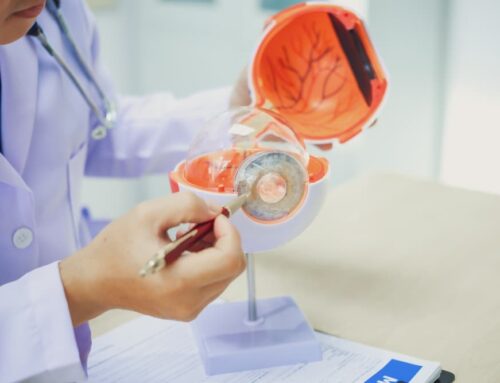Not being able to see clearly is annoying. If you’ve suffered from blurry vision, you know how uncomfortable it’s to squint all the time to see well. But blurry vision can happen to anyone, even if they wear glasses. Even though blurred vision may not necessarily indicate a major problem, some cases should be taken seriously.
When your eye cannot focus correctly, you may have blurred vision. Since the eye has more than 2 million functional parts, there are many eye conditions and disorders that can cause blurry vision, such as dry eye, cataracts, eye infections, and other eye diseases. We’ll go into more detail about this because dry eyes are one of the most frequent reasons for blurry vision.
Can Dry Eyes Cause Blurry Vision?
Dry eyes can lead to blurred vision, but why? A lack of moisture in your eyes makes the surface of your eyes less smooth, affecting how light is refracted and how images are focused in the eyes. This makes it difficult to see properly, leading to blurry vision.
Our eyes need moisture to keep them healthy. Eyes are covered in living cells that produce tears. These tears are crucial for lubricating and maintaining the health of our eyes. When not enough tears are produced, it can lead to dry eyes and blurred vision.
In order to prevent dry eyes from causing blurry vision, it is important to treat the underlying cause. Some treatments that may help prevent blurry vision from dry eyes include using eye drops, eating a healthy diet, and avoiding smoke or air pollution.
Dry Eye Symptoms
Many symptoms are associated with dry eyes, ranging from mild to severe. The most common ones include the following:
- Blurry vision
- Redness
- Discomfort
- Scratchy or burning sensations
- A feeling of grittiness
- General irritation
- Light sensitivity
- Reflex tearing*
If you experience any of these symptoms, you must visit your eye doctor for a comprehensive eye exam.
*Reflex tearing tends to happen when your eyes get irritated from a lack of moisture. Your nervous system gets a distress signal asking for more lubricant. To compensate for the dryness, your body produces a flood of tears. Because of their high water content, these tears behave differently from regular tears.
Causes of Dry Eyes
Insufficient tears or tears that dry up fast can cause dry eyes. Several factors can contribute to this condition, such as:
- Medications: Certain medications, like diuretics, antihistamines and antidepressants can cause dry eyes.
- Environmental conditions: Wind, dust, smoke or air pollution can irritate the eyes and cause dryness.
- Aging: As we age, our tear production decreases resulting in dry eye symptoms.
- Hormonal changes: Women going through menopause often experience dry eyes due to hormonal changes.
- Smoking and drinking: Both of these activities can decrease tear production and cause dry eyes.
- Certain diseases and conditions: Autoimmune diseases, like lupus or rheumatoid arthritis, can cause dry eyes.
In conclusion, blurry vision can be caused by a number of conditions and disorders. Dry eyes are one of the most common causes of blurred vision, and if treated promptly, it can prevent more severe complications in the future. If you experience any symptoms of dry eyes, you should consult an eye doctor for a comprehensive exam.
Make Sure Your Eyesight Is Crystal Clear
Having a yearly eye exam is one step in preventing eye diseases that impair vision. If you’ve found that your eyesight has become blurry, schedule a visit with your doctor.
At Eye Care Professionals in Reno, NV, we provide comprehensive eye care services and the latest technology to help diagnose and treat a wide range of vision problems. Our experienced optometrists and ophthalmologists will guide you through your visit, providing patient-centered care tailored to your needs. Visit us today and let our professionals keep your eyes healthy and clear!











